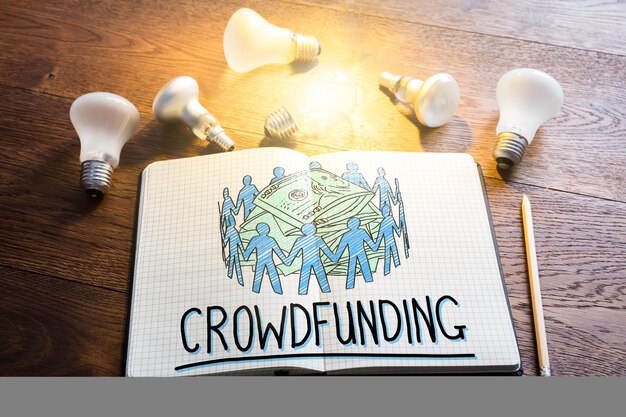Crowdfunding has emerged as a powerful tool for entrepreneurs around the world, providing a unique way to raise capital without relying on traditional financing options such as bank loans or venture capital. In Botswana, crowdfunding is gaining traction as an innovative way for small and medium-sized enterprises (SMEs) and startups to secure the funding they need to grow and scale their businesses. This article explores the concept of crowdfunding, how it works, the different types available, and how Botswana-based entrepreneurs can leverage this financing option to boost their ventures.
What is Crowdfunding?
Crowdfunding is the process of raising small amounts of money from a large number of people, typically via the internet. Entrepreneurs and businesses use crowdfunding platforms to present their ideas, projects, or products to potential backers who are willing to contribute in exchange for rewards, equity, or simply the satisfaction of supporting a cause they believe in.
Crowdfunding is particularly appealing to startups and small businesses that may not have access to traditional forms of financing. It allows them to engage a broad audience of potential investors and customers, build a community of supporters, and raise the necessary capital to bring their ideas to life.
Why Should Entrepreneurs in Botswana Consider Crowdfunding?
In Botswana, like in many other countries, entrepreneurs often face challenges such as limited access to credit, high-interest rates from banks, and a lack of investment capital. Crowdfunding offers an alternative solution, enabling entrepreneurs to raise funds without giving up ownership or taking on significant debt.
Here are a few reasons why crowdfunding is an attractive option for Botswana-based entrepreneurs:
- Access to Capital: Crowdfunding platforms provide access to a large pool of potential investors, making it easier to raise capital for your business.
- Market Validation: Crowdfunding campaigns help entrepreneurs validate their ideas by testing them with real customers before launching the product or service in the market.
- Building a Community: Successful crowdfunding campaigns help build a dedicated community of backers who are invested in the success of your business.
- Marketing Opportunity: A well-executed crowdfunding campaign can serve as a marketing tool, creating awareness about your business or product.
- Flexible Funding: Depending on the platform and campaign type, crowdfunding can be flexible, offering entrepreneurs the ability to raise funds based on specific project goals or equity offerings.
Types of Crowdfunding
There are several different types of crowdfunding, and the right one for your business will depend on your funding goals and the nature of your project. The four main types of crowdfunding include:
1. Reward-Based Crowdfunding
This is one of the most popular forms of crowdfunding, especially for creative projects and consumer products. In reward-based crowdfunding, backers contribute money in exchange for non-financial rewards, such as early access to a product, branded merchandise, or recognition on the company’s website.
For Botswana entrepreneurs, reward-based crowdfunding can be an effective way to pre-sell products or gauge interest in a new product before launching it in the market. Platforms like Kickstarter and Indiegogo are the go-to platforms for this type of crowdfunding.
Example: An entrepreneur in Botswana who wants to launch a new fashion brand can offer early-bird discounts, exclusive designs, or limited edition clothing items to backers who support their campaign.
2. Equity-Based Crowdfunding
Equity crowdfunding allows entrepreneurs to raise capital by offering equity (ownership shares) in their business in exchange for investment. This type of crowdfunding is suited for startups or growth-stage businesses looking to scale quickly, but it requires offering a portion of your business to investors.
Equity crowdfunding is regulated by financial authorities, so entrepreneurs must be prepared to meet legal and regulatory requirements. Platforms like Seedrs and Crowdcube have popularized equity crowdfunding in global markets, but similar options may emerge for Botswana-based businesses as the regulatory environment evolves.
Example: A startup in Botswana with a promising tech solution may use equity crowdfunding to raise capital from a pool of investors, offering them ownership in the company in exchange for funding.
3. Debt Crowdfunding (Peer-to-Peer Lending)
Debt crowdfunding, also known as peer-to-peer (P2P) lending, allows businesses to borrow money from individual lenders, rather than from traditional financial institutions. In this model, entrepreneurs repay the loan over time, typically with interest.
This form of crowdfunding is ideal for businesses in Botswana that need working capital or are looking to finance specific projects but do not want to give up equity in the business. It’s important to ensure that your business can handle the repayment terms before committing to debt crowdfunding.
Example: A Botswana-based agricultural business can raise funds through P2P lending to purchase new machinery or expand their operations, with the understanding that they will repay the loan over a set period.
4. Donation-Based Crowdfunding
Donation-based crowdfunding is typically used for charitable causes, social initiatives, or community projects. Backers donate money without expecting any financial return or reward. While not as common for traditional businesses, this form of crowdfunding can be a valuable option for entrepreneurs with a social or environmental focus.
For example, businesses with a mission to solve a pressing issue in Botswana, such as providing clean drinking water or supporting education, can use donation-based crowdfunding to raise funds and make a positive impact.
Example: An entrepreneur in Botswana with a sustainable project focused on environmental conservation may use a donation-based crowdfunding campaign to fund their initiative, relying on the goodwill of individuals who support their cause.
How to Launch a Successful Crowdfunding Campaign in Botswana
Successfully launching a crowdfunding campaign requires careful planning and execution. Here are some key steps Botswana entrepreneurs should follow to ensure the success of their crowdfunding efforts:
1. Define Clear Objectives
Before you begin, clearly define the purpose of your crowdfunding campaign. Are you raising funds for a new product launch, a business expansion, or a community project? Set specific, measurable goals, including the amount of money you want to raise and the timeline for your campaign.
2. Choose the Right Platform
Selecting the right crowdfunding platform is crucial. Research various platforms to determine which one aligns with your goals and business type. While global platforms like Kickstarter and Indiegogo are popular, look for any emerging local or regional platforms that may cater to Botswana or Southern Africa-based businesses.
3. Create a Compelling Story
One of the keys to a successful crowdfunding campaign is telling a compelling story. Clearly explain your business idea, why it matters, and how the funds will be used. Show potential backers the value of your product or service and how their contributions will make a difference. Visual elements such as videos, images, and product demos can help tell your story more effectively.
4. Set Reward Tiers (For Reward-Based Crowdfunding)
If you’re running a reward-based campaign, consider offering tiered rewards to incentivize higher contributions. These rewards could include early product access, exclusive items, or personalized experiences. Make sure the reward levels are attractive, but also affordable for your business to deliver.
5. Build a Community Before You Launch
Crowdfunding is not just about raising money; it’s about building a community of supporters. Start promoting your campaign before it officially launches. Engage with your target audience on social media, run pre-launch campaigns, and encourage people to share your campaign with their networks.
6. Maintain Regular Communication
Throughout the campaign, communicate regularly with your backers. Keep them updated on the campaign’s progress and share any milestones you achieve. Transparency and open communication will help build trust and keep backers engaged.
Legal and Regulatory Considerations for Crowdfunding in Botswana
Before launching a crowdfunding campaign in Botswana, entrepreneurs should familiarize themselves with any local laws and regulations regarding fundraising and investments. While the concept of crowdfunding is still relatively new in Botswana, it’s important to ensure that your campaign complies with existing financial and tax laws.
Consulting with a legal professional or business advisor is highly recommended to ensure that you meet any necessary regulatory requirements and to protect your business and investors.
Crowdfunding offers a unique opportunity for entrepreneurs in Botswana to raise capital, validate their ideas, and build a loyal customer base. Whether you choose reward-based crowdfunding, equity crowdfunding, debt crowdfunding, or donation-based crowdfunding, the key to success lies in careful planning, transparent communication, and selecting the right platform for your goals.
As the crowdfunding landscape in Botswana continues to evolve, more opportunities will arise for entrepreneurs to tap into this innovative financing option. By leveraging crowdfunding, businesses can gain access to the capital they need to thrive and contribute to Botswana’s growing entrepreneurial ecosystem.






